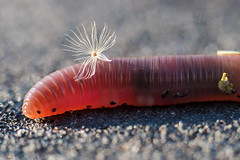Eudrillus Eugeniae, more commonly known as the African nightcrawler, originated in tropical areas of West African and have adapted in additional tepid areas all over the globe. It is a cherished composting worm for its worm manure known as worm castings or vermicast which is equal in size and structure to mice dung. This worm casting contrasting to others for the most part when using the correct bedding material can in point of fact be used in a fertilizer or seed spreader to cast out onto ones yard.
The development of plants and their roots has revealed some amazing results due to the biological composition as well as the number of beneficial aerobic microorganisms using castings. Employment of this product has in addition been revealed to make plants, whether flowers, vegetable, shrubs or trees, to be less receptacle to diseases. The exact cause for this is not so far known, however some theorize that it goes to survival of the strongest being vermicast generally speaking churn out much improved plants.
This type is a warm temperate earthworm requiring a least possible temperature of 60 degrees Fahrenheit in order to survive. African nightcrawlers are generally productive at composting in addition to reproduction at a temperature hovering around 78 degrees Fahrenheit nonetheless room temperature of around 70 degrees is sufficient for them. The African nightcrawler can live at temperatures of up to 110 degrees Fahrenheit in the shade as long as there is moving air on top of the surface.
Unlike other worms taking a 30 days for the cocoons, to hatch, the African nightcrawler eggs can emerge in 12 days under the proper environmental setting. The eggs are similar in size and shape of a tomato seed starting out as an olive shade when initially laid, changing to a darker bronze as they mature preceding to hatching.
Under proficient circumstances, an indivdual can count on a median of 3 to 4 nightcrawlers to emerge for every egg capsule while all adolecent nightcrawler laying anywhere from two cocoons a week to a dozen per week depending on the environment in which they are bred.
Being this is a larger earthworm, it does take more time to reach maturity, fundamentally five months. The African nightcrawler obtains a span of six to eight inches in eight months time with some exceeding this length over an additional 30 to 60 days to to a size of up to 10 inches.
African nightcrawlers have turned out to be a favorite for fishermen from spring through fall and specially during the warmer months. Being this worm cannot be chilled or it will die, it survives well in tepid lakes and ponds, outliving the majority of other worms. A further advantage over mainly other worms purchased at bait stores is the reality the others are chilled, hence sending the other worms into shock going from a chilled temperature to the warmer water.
Since African night crawlers will not endure in a chilled environment without deadly injury being done within a few hours, live bait machines and most bait suppliers do not support this earthworm. This leaves the majority of enthusiastic fishermen at a deficit as those that have fished with this earthworm find it a favorite friend.
Contrasting to some other composting worms, this species does not do as well in a worm farm with vegetable leftovers and cardboard. It does exceptionally well as a dung worm and will engulf damp torn newspapers. A further bedding material used for this earthworm is Sphagnum peat moss which is generally available.
If you are raising African night crawlers for fishing, we have found the finest way to beef them up is to apply Purina Worm Chow as both the major feed supply or a supplement. Our findings have also found that the application of this particular worm food has benefited our earthworm reproduction by mounting the cocoon laying ratio for every worm. Environmental conditions also will perform an crucial role on the cocoon laying ratio.
Bruce Galle has been referred to as ” Master Wormologist” by Outdoor Life Magazine.” He offers valuable information on African Nightcrawlers from his African Nightcrawlers For Sale site.










I got this email from Bill… all who read about the jap failure.
DO NOT BUY K-1.
BUY only K103
Go to this site and read it thoroughly: http://www.MedicalCorps.org
The main man is Chuck Fenwick. He and I have had several e-m exchanges. He’s fine.
Again, you do not want K1. There is huge demand for K103 so be patient.
all the best………………..Bill